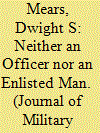| Srl | Item |
| 1 |
ID:
179191


|
|
|
|
|
| Summary/Abstract |
In recent years, the growing corpus of modern scholarship on the history of Spanish Italy has challenged and often overturned most of the profoundly biased narratives from nineteenth-century Italian historiography. Still, the memory of the massive Italian military involvement in the conflicts that shaped the history of the Spanish Low Countries hinges upon that of the two iconic Italian generals of the Army of Flanders: Alessandro Farnese and Ambrogio Spinola. In addressing this issue, this article offers an overview of the history of the Italian natione of the Army of Flanders based on the complex trajectory followed by its longest-lived infantry unit, its terzo vecchio.
|
|
|
|
|
|
|
|
|
|
|
|
|
|
|
|
| 2 |
ID:
179193


|
|
|
|
|
| Summary/Abstract |
The 1932 Battle of Shanghai was the first instance of a modern war waged in a large city. This paper examines how the conflict unfolded from one urban district—Zhabei—to a large area north of the city, all the way to Wusong, from a densely populated and built-up urban area to the countryside; and how the conflict’s nature and the balance of power shifted drastically. The Japanese army was not prepared to wage a war that, in its first phase, amounted to an urban guerrilla campaign by the Chinese, while the displacement into rural areas played to the advantage of the Chinese troops. This paper looks at the crucial role spatial factors played in the successes and failures of the contending armies.
|
|
|
|
|
|
|
|
|
|
|
|
|
|
|
|
| 3 |
ID:
179195


|
|
|
|
|
| Summary/Abstract |
Why were casualties on Omaha Beach on D-Day so high? Many accounts assert that the unusually high casualties suffered can be traced to the U.S. Army’s refusal to employ specialized tanks developed by the British army, nicknamed “Armored Funnies.” This article examines the roots of this legend and details American and British plans for employing specialized tank support for Operation Neptune in June 1944. It concludes that the U.S. Army did not refuse to employ the Armored Funnies, but that delivery of some of these specialized tanks did not occur in time due to British shortages. This episode highlights the difficulty of attempting to harmonize military equipment and tactics in time-constrained joint operations.
|
|
|
|
|
|
|
|
|
|
|
|
|
|
|
|
| 4 |
ID:
179194


|
|
|
|
|
| Summary/Abstract |
Harvey Arthur DeWeerd (1902–79) was an important member of the earliest generation of academic military historians in the United States. He was the first professional scholar to edit what is now the Journal of Military History, taught some of the first dedicated military history courses in the country, and was the second military historian hired by RAND. DeWeerd also contributed to the birth of security studies and served as an editor of the Infantry Journal during World War II.
|
|
|
|
|
|
|
|
|
|
|
|
|
|
|
|
| 5 |
ID:
179192


|
|
|
|
|
| Summary/Abstract |
U.S. Army contract surgeons in the nineteenth century were in many ways indistinguishable from their commissioned counterparts; however, as civilians they were treated quite differently when it came to some legal entitlements, which included eligibility for the sole military decoration of the period, the Medal of Honor. This article compares the experiences of four different contract surgeons who claimed entitlement to the Medal of Honor and the varying outcomes. These case studies offer a window into the various power structures of the time, demonstrating that some military awards were influenced by gender, influence, timeliness, and merit relative to other potential recipients.
|
|
|
|
|
|
|
|
|
|
|
|
|
|
|
|
| 6 |
ID:
179190


|
|
|
|
|
| Summary/Abstract |
Modern scholarship uses the language of professionalism when referring to the armies of the Romans. The armies and their soldiers are seen to have become more professional from the mid-second century BCE. This paradigmatic view of Roman history invites the question as to whether “professionalism” is the appropriate language to apply to Rome's armies from 200 BCE to the battle of Actium in 31 BCE. The paper confines itself to the period 200 to 31 BCE but raises questions that can reasonably be asked of the use of the terms to describe Roman armies in the imperial period.
|
|
|
|
|
|
|
|
|
|
|
|
|
|
|
|
| 7 |
ID:
179196


|
|
|
|
|
| Summary/Abstract |
This article examines post-Cold War debates over the U.S. Army’s participation in peacekeeping operations. Peacekeeping meant different things to policy-makers, army leaders, public intellectuals, and those who served on such missions. Army leaders were generally not enthusiastic about these operations but recognized they were indicative of future trends. Peacekeepers accepted the role, even if they struggled to understand how to navigate the gray zone between peace and war; political commentators sought to use peacekeeping missions to advance their own causes. Participants in these debates articulated not only their thoughts on peacekeeping, but radically different visions of what they wanted the American soldier of the 21st century to be.
|
|
|
|
|
|
|
|
|
|
|
|
|
|
|
|